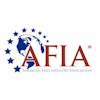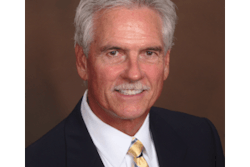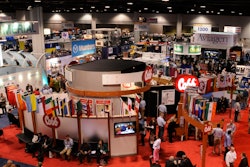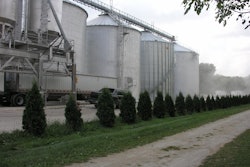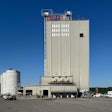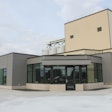"I'll see you back at the office."
We've all heard or uttered this phrase, when departing on a business trip. For Dan Shefland, vice president operations/engineering for McC Inc., it holds a distinctly different meaning. Those were the last words he ever spoke with McC Inc. project manager Dave Kammerer.
"They were sitting on the runway waiting to depart and we had just talked about our missing laptop and we decided to deal with it later when we were all back in the office," says Shefland. "As it turned out, there were a lot more important things to deal with when we returned home."
Shortly after Shefland hung up the phone with Kammerer, the single-engine Piper 46 aircraft carrying Kammerer, 41; Environmental Control Systems Inc., co-owner Waylon Karsten, 36; and founder/president of McC Inc., Dave McCormick 44; who was piloting the aircraft, disappeared from radar shortly after takeoff.
The trio had left the Fuel Ethanol Workshop meeting in St. Louis the morning of June 28, 2007 and left Shefland to man the McC Inc. booth. Around 9:30 a.m. Shefland received a call from a McC Inc. charter pilot, explaining that McCormick's plane was missing. Hours later, authorities confirmed the wreckage of a plane found 80 miles from St. Louis was indeed that of McCormick's plane.
What ensued was a chain of events that changed the lives of McC Inc.'s leadership team and its nearly 300-employee team forever. However, out of the tragedy of that day, McC Inc. learned many lessons. Some were hard. Some challenged their beliefs to the core, but in nearly every instance, these lessons reinforced the reasons why they got in the business in the first place.
First lesson: Set and Meet Short-term Goals
In the face of incredible shock, McC's leadership team was faced with two immediate short-term goals: Take care of our employees and reinforce customer confidence in the company.
"Being a family-oriented company, naturally it was a difficult time getting through the memorial services and funerals," recalls Jon Walters, president, McC Inc. "It was the week of the July 4th holiday, so what should have been a festive lead-in to a long holiday weekend was, in fact, something completely different."
Walters and other members of the management team — including Shefland, CFO Mark Schmid, and CEO Deb McCormick — made addressing employee concerns and fears an immediate priority.
Right away, the team met with groups of employees and arranged conference calls to the various job sites, to keep them apprised of the situation from the day of the accident, through the funerals and as the new management team assumed leadership.
In addition to keeping the lines of communication open between management and the employees, the next short-term goal was to ensure another key message was sent to both internal and external audiences: McC Inc. was not going away.
"We had a payroll due and we had payments to make to suppliers that week and as a group, we knew it would be critical for morale and for our customers that we make those payments," says Schmid. "Honestly, there were probably some folks that weren't sure what would happen to us, and hitting those key milestones turned out to be very important to us."
One scenario McC Inc. was lucky to avoid was the lack of a clearly defined leadership structure. Ironically, work had been done to map out a succession strategy, driven primarily by expected company growth. Little did anyone know the strategy — considered even in the most optimistic terms as a "work in progress" — would be tested so quickly.
Walters had been with McC Inc.from almost the beginning and his years of field experience and operational acumen, made him an ideal choice to assume the top spot.
Fortunately, McCormick had identified the need to add more breadth of experience to the management team, which was demonstrated in Walters' and Shefland's involvement in many aspects of McC operations.
"Although that cross-pollination process was certainly accelerated during the months after the accident, we were extremely fortunate to have the experience of Jon, Dan and Mark to draw upon," says COO Cortney McCormick. "When it came to hiring, my brother always felt you should look to hire your replacement. This philosophy has proven its worth with the team in place today."
McC Inc. was lucky. They had initiated succession planning and had qualified, experienced people in place to assume those key leadership positions. One aspect that did catch them unprepared was dealing with the media. In less than an hour from first hearing about the missing aircraft and less than an hour into his drive home from St. Louis, Shefland was already getting calls from the media.
"You try and be considerate but I truly didn't have any useful information," Shefland recounts. "I was still somewhat in shock, and honestly, the local TV station was very understanding, but it really illustrated how fast news can travel.
"In fact, some reports were surfacing that had me listed as one of the passengers on the plane, based on registration information from the trade show. So in addition to news traveling fast, not all of it was accurate," he says. "Thankfully, I called my wife right away to let her know where I was."
While managing media is indeed a critical component of any crisis plan, it was just the beginning of a very challenging period for McC Inc.
Business lessons:
Move Ahead
While it was impossible for management and employees to assume a "business as usual" demeanor after the accident, the fact that McC Inc. was in the middle of several projects and slated to begin a few more shook them back to reality rather quickly.
"I was in New York in the middle of a concrete pour for a slip-form structure when I heard the news," Walters recalls. "I turned to the guys on the site and said, 'I've got to go back and you need to finish the pour.' They wanted to make Dave proud and they did by doing a great job on that pour."
There are many stories like that about McC Inc. employees, in addition to the many vendors, suppliers and even competitors who went the extra mile to offer assistance after the accident. The gestures brought comfort in a time of sorrow and reinforced all that is good about this industry, but it also reminded McC the need to keep moving forward and ultimately, do some soul searching about their business.
Timing is Everything
A cataclysmic event like an accident often serves as the genesis for a period of great change. In McC's case, it wasn't the only catalyst for change to hit them at that time.
"Shortly after the accident, the biofuels business, which Dave had really committed his entrepreneurial vision to building for McC, had begun to stagnate and weaken," says Schmid. "With so much of our business tied into the biofuels sector, we needed to make some big adjustments and quickly."
A major adjustment came in the form of creating an operating model which more closely resembles a traditional business hierarchy — a management team to run day-to-day operations with sales/growth responsibilities, reporting to a board of directors who oversee overall operational functions.
"It was difficult for sure as David was the ultimate entrepreneur and decisionmaker," says Shefland. "So the question became 'how do we balance that aggressive, opportunistic way of thinking, with a more measured, pragmatic approach which relied on achieving consensus?' It was tough, but the answer for us was to get back to what we do best ...build great projects."
This was a tough lesson because it required McC to call people whose projects they had turned down earlier when the biofuels boom was on. Now they had to go back to those same people looking for new business. Understandably, there were some folks who weren't interested in hearing what McC had to say, but, by and large, people knew what went in to making McC's quality reputation and had seen that the company was moving ahead in a positive direction.
"Getting back to our roots was extremely important," says Walters. "We are excellent slip-form builders and now in addition to grain, we're spreading our expertise to different market segments from coal, cement, energy and other industrial storage and construction needs.
"The move to diversify our market approach was a result of the new group management style, and while difficult at first, is paying dividends now," he adds.
Lessons learned: McC Inc. Today
While each member of the management group was affected by the tragedy in a profound way, they also each have unique perspectives of important takeaways from their collective experience of the past 10-plus months.
"From my perspective it became clear how important it is to keep adequate life insurance to protect shareholders and the company, in addition to having a healthy working capital position during a crisis situation," says Schmid.
For Dan Shefland the lesson is more personal but holds significant value for business operators: "Don't take anything for granted; whether it's your company, your personal life or projects at work, you need to plan ahead in case something goes wrong, because as great as things can be one day, it can all go terribly wrong the next."
After pondering the question for a long time, Walters' takeaway centers around the human element of a business: "The best thing that came out of all this was the realization that our people were prepared to step up and lead in some way. Had we not sought out highly motivated people who were driven to succeed at their job, regardless of what that job was, we probably wouldn't have come through this."
Cortney McCormick probably sums it up best, however, when he looks at the spirit of McC Inc.: "Through it all you have to stay true to your vision. David's vision remains our vision. That success is a function of design, not chance. And we owe it to the memories of those men and the current and future members of the McC Inc. family to provide the tools needed to increase our breadth of knowledge and experience."
Based on what's been accomplished so far, David McCormick and Dave Kammerer would be very pleased at the progress that's been made, and extremely proud of how McC Inc. is prepared for the future.
Balancing Your Message with 'The Need to Know'
Our industry is one of high reward and sometimes, high risk. An engulfment, fire or natural disaster, explosion or derailment are all too-common occurrences and create incredible stories and footage for media.
FEED & GRAIN visited with Tim Oliver, president of MorganMyers, a Waukesha, WI-based marketing communications agency, who has counseled clients on crisis communications strategies.
In the unlikely event your business has a crisis communication situation, Oliver recommends that time spent upfront on a plan, setting communications priorities and understanding what your media response should be.
Plan. For most businesses it shouldn't be a large formal document, but you should talk through and create an outline of who leads and your contacts during an incident. Make sure:
- several people involved in managing the organization have a copy of the outline;
- there's a 2nd and 3rd person designated in case the primary spokesperson isn't available; and,
- all copies of the plan aren't in the same location.
Events in a crisis move rapidly and you won't have time to choose who's doing the talking or looking for names and phone numbers in the aftermath, so plan ahead.
Priorities. Oliver stresses your first priority is those most directly impacted. That means the order is family and employees— if there is an injury or death — then community. If there's still a threat to public health, you now work with emergency services and media to get the word out.
Media response. Media in a crisis situation work to get accurate news out fast, often as a matter of public safety, and provide an emotional context for the facts of a story.
If reporters arrive on site, pick a spot and time to talk with them so they won't hamper recovery efforts. If possible, pick a location that can accomodate cameras but be mindful of any potentially negative background imagery. Allow law enforcement to establish a safe barrier for photographers away from the incident, especially if an cause investigation is ongoing.
Media will ask direct, insistent questions about injuries, and the facts and cause of an incident before the answers are known. In most cases the best approach for all involved is:
- letting the authorities, (police or fire department) comment to the media on the facts related to the incident. They are expected to investigate likely causes and are the proper information sources for the public at large; and,
- for you to concentrate, even when talking with the media, on messages of concern for those impacted by the event, and messages related to company operations.
When someone has been injured or killed it's natural to express sympathy for all involved; they're your employees or co-workers, and they're often your friends. In addition to your in-person communication with family and employees it's appropriate to express your concern through the media, reaching the larger community.
Media can aid communication to employees when circumstances prevent you from gathering your employees in one location. Knowing which radio and TV stations are viewed locally, and working with them, can ensure the people important to your company are staying informed about the status of the risk, status of your facility, whether you'll be open, etc.
Oliver notes that each situation is different, but following general guidelines and having some perspective on how the event will be covered can help you prepare.
